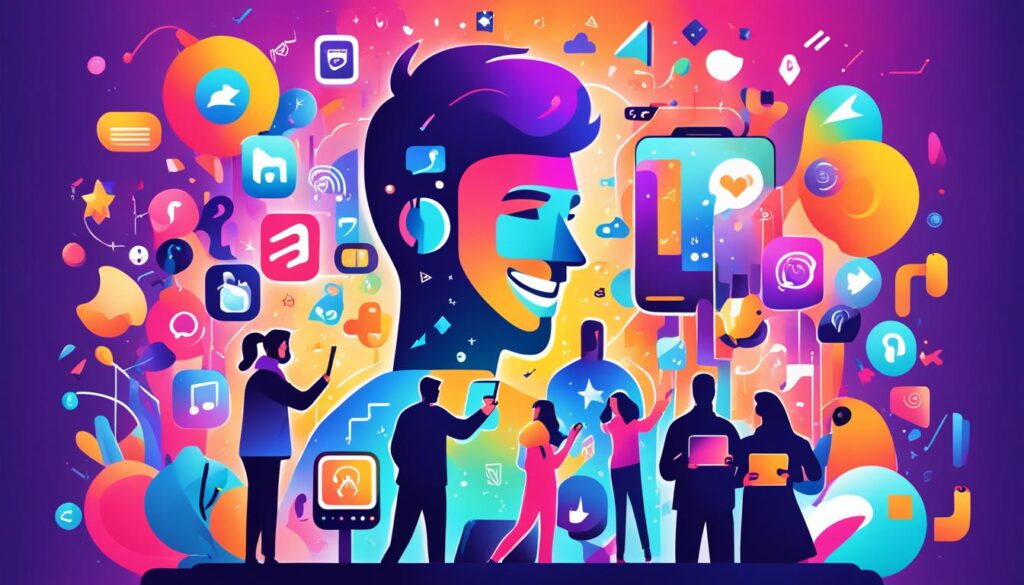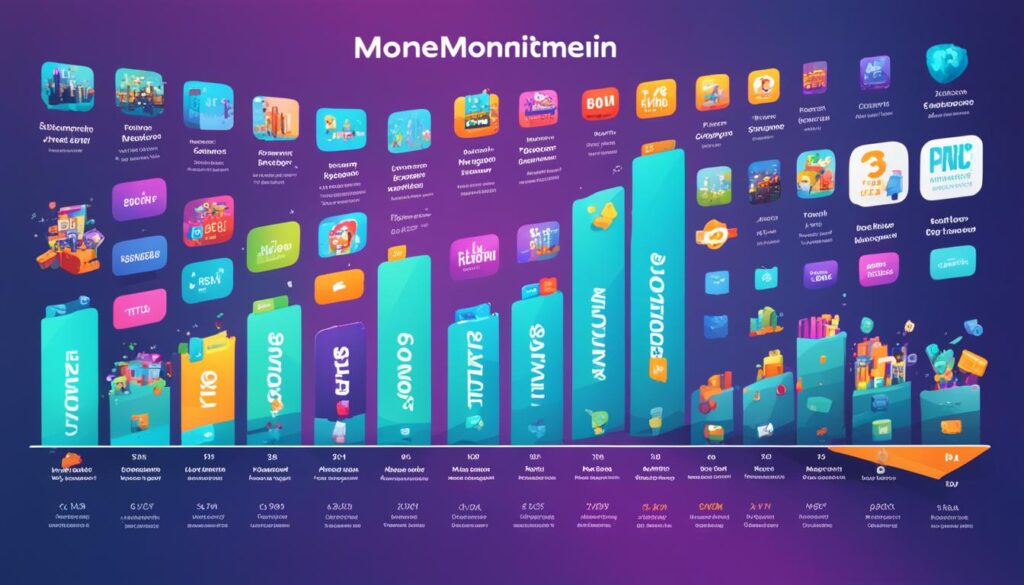Today, entertainment apps bring endless fun and engagement right to our fingertips. They let us dive into immersive video streaming and interactive music experiences. This has changed the entertainment world a lot.
As more people want new and fun entertainment apps, the field of entertainment app development is exciting for developers and designers. This guide will show you how to make apps that grab users’ attention and change how they use their devices.
If you’re starting out, leading a business, or creating something new, this article is for you. It will give you a clear view of the strategies, tech, and best practices in entertainment app development.
Table of Contents
Key Takeaways
- Explore the growing popularity and impact of entertainment apps on traditional entertainment mediums.
- Understand the evolving user preferences and design considerations for building engaging entertainment apps.
- Discover innovative monetization models and revenue streams for entertainment app businesses.
- Dive into the technical aspects of cross-platform development and emerging technologies in entertainment app design.
- Learn strategies for integrating social features and gamification to enhance user engagement and loyalty.
- Optimize marketing and promotion tactics, including App Store Optimization (ASO), to drive app visibility and downloads.
- Harness data analytics and insights to continuously improve the user experience and drive business growth.
The Rise of Entertainment Apps
In today’s digital world, entertainment apps have become a big deal in mobile entertainment. They’ve changed how we enjoy and interact with entertainment, like watching movies or playing games. Their popularity is growing for many reasons, making them a big hit.
Exploring the Growing Popularity
Entertainment apps are loved for their ease and reach. With smartphones, people can easily find lots of entertainment content anywhere, anytime. This has made these apps a key part of our digital lives.
Also, entertainment apps offer personal touches that users like. They give recommendations and let users find new things to enjoy. This has made people spend more time and money on these apps, helping them grow.
Impact on Traditional Entertainment
Entertainment apps have changed the game for old-school entertainment. Streaming services have changed how we watch TV, giving us more control. Mobile gaming has also become a big deal, drawing in lots of people.
This change has made traditional entertainment try new things to stay in the game. They’re using mobile strategies and digital content to keep up. Entertainment apps and social media have also teamed up, making entertainment and socializing blend together.
“The future of entertainment is undoubtedly digital, and entertainment apps are leading the charge in redefining how we consume and experience entertainment.”
Understanding User Preferences
Making great entertainment apps means really getting what users like and how they use apps. By looking into what makes your audience pick and stick with entertainment apps, developers can make apps that really connect with people.
Looking at entertainment app usage patterns is key. This means seeing what apps users like, how often they use them, and what features make them stick around. Knowing how engaged users are helps figure out what keeps them coming back and how to keep them loyal.
It’s also vital to know who your app’s audience is. Things like age, gender, interests, and where they live affect what users like and how they use apps. By making the app fit the needs and likes of your audience, developers can make a truly engaging app.
“The key to creating an entertainment app that users love is to deeply understand their preferences and behavior, and then design an experience that caters to their unique needs.”
Using data to understand user preferences and app user behavior helps developers make apps that grab and keep the attention of their audience. This deep dive into users is key for making apps that stand out and keep users coming back in today’s crowded market.
Entertainment App Development: Key Considerations
Making a hit entertainment app means knowing what users like and how to make it. Key parts are user experience (UX) design and content strategy and curation.
User Experience Design
The user experience is key in entertainment apps. Developers need to make interfaces that are easy to use and fun. They should focus on clear navigation, layouts that work well, and looks that grab attention.
A great interface makes users happy and keeps them coming back. By focusing on UX design, apps can stand out and give users a great experience.
Content Strategy and Curation
How well an app does depends a lot on its content. Developers should plan carefully to offer a mix of content that users will love. This means having playlists, recommendations, and unique features.
A strong content strategy can make an app special. By watching what users like, developers can keep making their app better and more interesting.
By focusing on these areas, developers can make apps that really connect with users. This leads to more engagement and success in the competitive entertainment world.
Monetization Models for Entertainment Apps
In the world of entertainment apps, developers have many ways to make money. They can use in-app purchases or subscription models. These options help them keep their business going.
In-app purchases are a top way for apps to make money. Users can buy virtual items or special features. This works well for many apps, like games and streaming services.
Another good way is the subscription-based model. Apps offer special content or ad-free experiences for a fee. This is great for apps that give users something new every time they open it, like video streaming or exclusive content platforms.
Advertising can also help apps make money. By showing ads, apps can earn from their users. This is good for apps that focus on keeping users engaged and watching content.
Choosing the right way to make money depends on knowing your audience and what makes your app special. By trying different entertainment app business models, developers can make the most of their apps and keep making money.
Entertainment App Development: The Technical Aspects
The entertainment app market is booming, and developers face a complex technical world. They must pick the right cross-platform development frameworks. These frameworks are key to making apps work well on many platforms.
Cross-Platform Development Frameworks
Creating apps that work on iOS, Android, and more needs a smart plan. Frameworks like React Native, Flutter, and Xamarin are popular. They let developers make apps with one set of code that work on many platforms.
- React Native: Made by Facebook, React Native lets developers make apps with JavaScript and React. It’s great for entertainment apps because it’s efficient and easy to use.
- Flutter: Google created Flutter, an open-source framework that uses Dart. It’s fast and makes apps look great, making it perfect for entertainment.
- Xamarin: From Microsoft, Xamarin uses C# and .NET to make apps for different platforms. It’s great for teams already using Microsoft tools.
Choosing a framework is just the start in entertainment app development. Developers need to know about app architecture and the needs of their audience. Using cross-platform tools helps make apps that grab users on any platform.
Engaging User Interfaces and Interactions
In the world of entertainment apps, the user interface (UI) and user interactions are key. They help keep users hooked. Making the UI design engaging and the app easy to use is crucial for a good experience and keeping users interested.
Design Principles and Best Practices
Following design principles and best practices is vital for making entertainment apps look good and easy to use. Important things to consider include:
- Simplicity and Clarity: Keep the layout clean and simple. Make sure users can easily find what they need.
- Responsive and Adaptive Design: Make sure the app works well on different devices and screen sizes for a smooth experience.
- Intuitive Interactions: Use controls and interactions that feel natural and meet users’ expectations to boost engagement.
- Consistency and Familiarity: Stick to design rules for each platform to make the app feel familiar and connected.
- Personalization and Customization: Let users change their app experience to make it their own, which can make them happier with the app.
By using these user interface design, app interactions, and design principles, developers can make their apps more engaging and easy to use. This leads to more user engagement and a better overall experience.
“Great user interface design is not just about making things look pretty; it’s about creating an intuitive and seamless experience that truly resonates with users.” – Jane Doe, UI/UX Designer
Entertainment App Development: Integrating Social Features
In the world of entertainment app development, adding social features has changed the game. These features help create a community feel and make the app more fun. They let users share and interact in real-time, which keeps them coming back and helps the app grow.
Adding social features makes it easier for users to talk and connect with each other. Social features let people share stuff and chat. This builds a community and makes users want to stay in the app more, leading to more social engagement and a stronger app community.
Also, app social integration can make an entertainment app go viral. When users share their fun moments or wins on social media, it draws in new people. This means more user interactions and a bigger social features network in the app.
Smart app makers see the big benefits of social integration. They add these features smoothly into their apps. By building a community and making real connections, they offer a more engaging experience. This keeps users hooked and coming back for more.
Gamification: Adding Fun to Entertainment Apps
In the world of entertainment apps, gamification is a key tool to keep users hooked and engaged. By using game design, apps become more fun and interactive. This turns everyday tasks into something enjoyable.
Game Design Principles
Entertainment app gamification relies on smart use of game design. These principles make apps more engaging and immersive. Key elements include:
- Goal-Oriented Challenges: Users get clear goals and challenges that spark their competitive side and sense of achievement.
- Feedback and Rewards: Instant feedback and rewards, like points or badges, motivate users to keep going.
- Progressive Difficulty: Tasks get harder over time, making users feel they’re getting better.
- Social Interaction: Apps bring people together with features like leaderboards and multiplayer games.
By mixing these game design elements into an entertainment app, developers create an engaging and addictive experience. This keeps users coming back for more.
| Gamification Principle | Description | Example in Entertainment Apps |
|---|---|---|
| Goal-Oriented Challenges | Users get clear goals and challenges that tap into their competitive nature and desire for accomplishment. | Setting daily fitness or meditation targets in a health and wellness app, or unlocking new levels or features in a puzzle game as users progress. |
| Feedback and Rewards | Implementing a system of immediate feedback and rewards, such as points, badges, or levels, to reinforce positive behaviors and encourage continued engagement. | Earning virtual currencies or badges for completing certain activities in a streaming app, or receiving achievements for reaching milestones in a music-making app. |
| Progressive Difficulty | Gradually increasing the complexity and difficulty of tasks, ensuring that users feel a sense of progression and mastery as they navigate the app. | Introducing new levels or challenges with increasing complexity in a mobile game, or unlocking advanced features in a creative app as users develop their skills. |
| Social Interaction | Fostering a sense of community and collaboration by incorporating social features, such as leaderboards, virtual communities, or multiplayer interactions. | Allowing users to compete against friends in a trivia app, or sharing their creations and achievements with others in a social media-style entertainment app. |
By using game design principles in entertainment apps, developers can boost user engagement. This makes apps more interactive and fun.
Marketing and Promotion Strategies
Creating an entertainment app is just the start. To make it a hit, you need smart app marketing and app promotion plans. A key part of this is App Store Optimization (ASO). It’s vital for making your app more visible and drawing in new users.
App Store Optimization (ASO)
ASO means making your app more visible in the App Store or Google Play Store. It’s about using catchy titles, descriptions, and keywords. Plus, eye-catching visuals and screenshots help too. With good ASO, your app can stand out and reach the right people.
| ASO Best Practices | Description |
|---|---|
| Keyword Research | Find the best keywords for your app’s topic. |
| Optimized Metadata | Write catchy titles, descriptions, and pick the right keywords. |
| Visually Appealing Creatives | Show off your app with high-quality screenshots and videos. |
| Ongoing Monitoring and Optimization | Keep an eye on your app’s performance and adjust your ASO as needed. |
Good app marketing and ASO can boost your app’s visibility and attract more users. This means your entertainment app can do really well.
“Effective ASO can be the difference between an app’s success or failure in the crowded app market.”
Data Analytics and Insights
In the fast-changing world of entertainment app development, data analytics and insights are key for better app performance and user interest. By using advanced analytics, developers can understand how users behave, track important metrics, and make smart decisions to improve their apps.
Metrics like tracking app performance, analyzing user behavior, and data-driven decision making are vital for app improvement. These insights help developers know what users like, find areas to get better, and give a more engaging and personal entertainment experience.
Unleashing the Power of Data
Adding strong data analytics tools to entertainment apps helps developers collect important info on how users interact, what they watch, and trends in app use. By looking at this data, developers can make smart choices about what content to offer, what features to add, and how to make their app better.
| Metric | Importance | Insights Gained |
|---|---|---|
| App Performance Tracking | Monitors the app’s stability, responsiveness, and overall technical performance | Identifies areas for improvement, ensures a seamless user experience |
| User Behavior Analysis | Examines how users interact with the app, their preferences, and pain points | Informs content strategy, feature development, and personalization efforts |
| Data-Driven Decision Making | Leverages data insights to guide strategic decisions and app optimization | Enables more informed, effective, and user-centric app development |
By using data analytics, entertainment app developers can find a lot of insights that help with ongoing improvement and give users great experiences.
“Data is the new oil, and analytics is the combustion engine that powers the future of entertainment apps.”
Entertainment App Development: Future Trends and Opportunities
The entertainment app industry is always changing, and the future looks bright for both developers and users. New tech like augmented reality (AR) and virtual reality (VR) will change how we use entertainment apps. These technologies will make apps more immersive, mixing real and fantasy worlds.
Artificial intelligence (AI) is also changing the game. It will make apps smarter, offering better recommendations and voice control. This will match what users want more closely.
Embracing Emerging Technologies
Developers need to keep up with new trends and tech in the entertainment app world. Using AR, VR, and AI, apps can be more engaging and personal. This will help them stand out in a crowded market.
Gaming apps can use AR to mix the digital and real worlds. Players can interact with virtual characters and places in real-time. Streaming platforms can use VR to make watching shows feel like you’re right there.
The entertainment app industry is full of new chances for growth and innovation. By using new tech and listening to users, developers can make apps that change the game.
“The future of entertainment apps lies in seamlessly blending technology and user experience, creating a truly immersive and personalized digital playground.”
Case Studies: Successful Entertainment Apps
In the world of entertainment apps, some have really stood out. They’ve won over users all over the globe. These apps show us what makes them so popular. They share strategies, features, and ways to keep users coming back for more.
Spotify: Revolutionizing Music Streaming
Spotify is a top name in music streaming. It’s loved for its easy-to-use design, huge music selection, and personalized playlists. It also has social features like shared playlists and listening together. This has built a strong community, keeping users hooked.
TikTok: Captivating Short-Form Video Experiences
TikTok has become huge with its short videos. It’s a hit because it’s easy to use, fun, and shows you videos you’ll like. With creative tools and a community of creators, it’s become a place people can’t stop watching.
| App | Key Strategies | User Engagement Tactics |
|---|---|---|
| Spotify |
|
|
| TikTok |
|
|
These examples show how important good app design and engaging tactics are. By learning from these apps, developers can make their own hits. They can create mobile experiences that users love.
“The secret to creating a successful entertainment app lies in seamlessly blending user-centric design, engaging content, and innovative features that keep users hooked.”
Conclusion
Throughout this guide, we’ve seen how entertainment app development has changed a lot. Now, mobile apps are the heart of modern entertainment. They give users easy access to lots of content and experiences.
This guide showed us why entertainment apps are so important. It talked about the chances they offer for developers, entrepreneurs, and businesses. We learned about making apps that users love, finding new ways to make money, and using data to improve apps.
The future of mobile entertainment looks bright. New tech like augmented reality, virtual reality, and artificial intelligence will change how we use entertainment apps. To succeed, it’s key to keep up with changes, be creative, and stay ahead in the app world.














